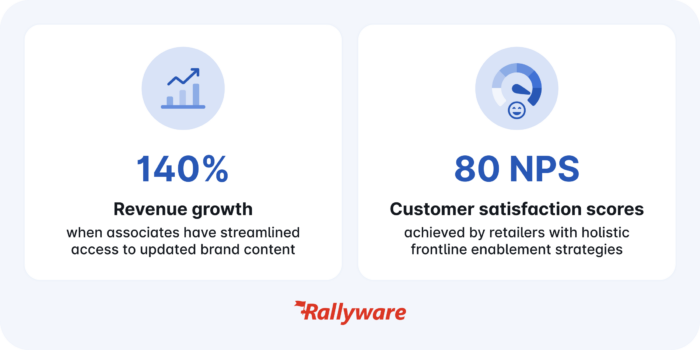Industry Spotlight: 3 Direct Selling Industry Trends in 2023 and How Technology Can Respond to Them
How Cost-Cuts and Brick-and-Mortar Resurgence Have Redefined Frontline Enablement
Retail today sits at a crossroads, shaped by two seemingly contradictory forces: the need to slash costs and the resurgence of brick-and-mortar stores. On one side, economic pressures demand leaner operations; on the other, a renewed emphasis on in-store experiences calls for greater investment in customer-facing roles. This paradox has propelled frontline enablement into the spotlight, transforming it from a tactical concern into a strategic imperative.
The frontline workforce—those employees directly interacting with customers—has become the focal point of this transformation. Empowering these workers is no longer a supplementary measure but a necessity for survival in a rapidly evolving retail environment. Assisted-sale retailers, who thrive on personalized service and knowledgeable staff, are particularly at the crux of this shift.
Economic Pressures as a Catalyst for Innovation
The retail industry continues to face economic challenges such as inflation, supply chain disruptions, and evolving consumer behavior. To maintain profitability, many retailers have turned to cost-cutting strategies, including workforce reductions. Companies like Farfetch and Ssense, for instance, have significantly downsized their teams to manage expenses. While these measures can provide short-term financial relief, they also carry the risk of diminishing customer satisfaction—a critical factor for long-term success.
However, economic adversity has also spurred innovation. Retailers have turned to advanced tools and technologies to amplify the impact of their leaner teams. Frontline enablement platforms, real-time communication tools, and custom training programs now play a crucial role in helping frontline associates meet elevated customer expectations. These areas of focus drive operational efficiency and ensure employees remain equipped to deliver exceptional customer experiences.
Far from being a temporary adjustment, these advancements reflect a broader transformation. Frontline associates are no longer confined to transactional roles. Instead, they [frontline employees] act as brand ambassadors, trusted advisors, and experience creators, navigating a leaner operational framework while exceeding customer expectations.
The Resurgence of Brick-and-Mortar Retail
Despite predictions of decline, physical retail is experiencing a renaissance. Brick-and-mortar stores are reestablishing themselves as essential hubs for customer engagement, particularly in the assisted-sale sector. These spaces thrive by offering immersive, high-touch experiences that digital platforms cannot replicate.
This resurgence is fueled by evolving consumer expectations. Customers now view stores not just as places to purchase goods but as experiential spaces where they can interact with products, engage with knowledgeable staff, and immerse themselves in brand narratives. Top brands like LVMH and Richemont have embraced this shift, expanding their physical presence and transforming traditional stores into dynamic, interactive brand showcases.
For frontline employees, this evolution represents both an opportunity and a challenge. Their roles have expanded significantly, requiring them to deliver memorable, personalized interactions that reflect the brand’s ethos. As experiential retail continues to grow, investing in frontline enablement has become a critical differentiator for retailers looking to stand out in a competitive market.
Redefining Frontline Enablement
Frontline enablement has undergone a fundamental transformation, becoming a cornerstone of modern retail strategy. Retailers are adopting comprehensive approaches to empower their teams, recognizing that well-equipped associates are central to delivering outstanding customer experiences.
Key pillars of frontline enablement include:
- Integrated Platforms: Unified systems consolidate training, communications, and operational tools, providing frontline staff with the resources needed to excel through one holistic experience.
- Upskilling and Retention: Personalized development paths enhance employee skills and foster loyalty, addressing the needs of a purpose-driven workforce.
- Community Building: Strong employee networks—both online and offline—encourage collaboration and deepen the connection between staff, retailer, and brands.
- Streamlined Brand Content: Access to regularly updated brand training ensures associates remain knowledgeable about products and brand storytelling, enabling superior customer interactions.
In the assisted-sale retail environment, these strategies translate into competitive advantages. Retailers who prioritize frontline enablement are not just meeting customer expectations but exceeding them, creating brand advocates and driving long-term loyalty.
The Business Case for Empowerment
The tangible benefits of frontline empowerment are compelling. Our data consistently shows that empowered teams drive significant business outcomes:

These data underscores a simple truth: investing in frontline enablement yields measurable returns. For assisted-sale retailers, where personalized interactions are the cornerstone of success, the stakes are particularly high. Empowered frontline teams not only enhance the customer experience but also reinforce the retailer’s market position.
Challenges and Opportunities Ahead
The journey toward robust frontline enablement is not without challenges. Budgetary constraints, resistance to change, and fragmented systems can impede progress. However, these obstacles also present opportunities for transformation. Retailers who embrace integrated enablement platforms and prioritize continuous training can create a resilient workforce capable of adapting to future disruptions.
Cultivating strong community networks and fostering a culture of collaboration further strengthens the bond between employees and the retailer, ensuring alignment with the company’s mission. According to Kearney’s 2024 analysis, adopting tools that streamline employee training and integrate data insights is essential for meeting evolving customer expectations while driving profitability.
As the retail landscape evolves, the question is not whether to invest in frontline enablement but how to do so effectively. Those who succeed will lead the way in a customer-centric, experience-driven future.
News and Insights on Workforce Training & Engagement
We’re among top-notch eLearning and business engagement platforms recognized for effective training and talent development, helping to empower distributed workforces
Subscribe
